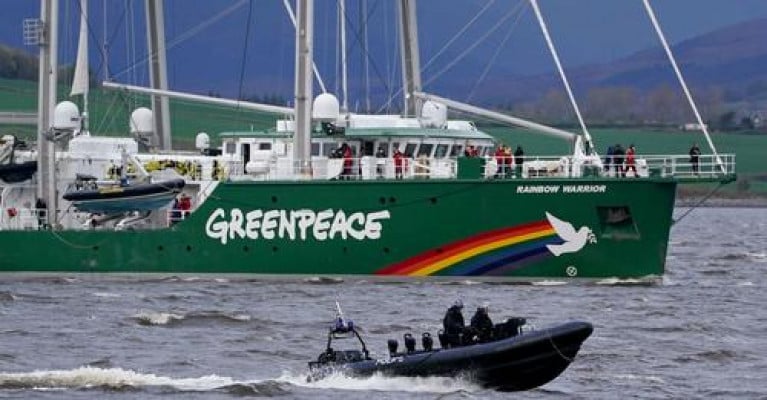Displaying items by tag: Greenpeace
SailGP has been called out by Greenpeace’s executive director in New Zealand/Aotearoa over its response to a race cancellation prompted by the presence of dolphins on the racecourse.
Racing was postponed on Saturday 23 March at the second annual New Zealand Sail Grand Prix in Christchurch, leading to a so-called ‘Super Sunday’ where Australia’s SailGP team suffered a massive collision that forced their retirement.
Following the event, SailGP co-founder Sir Russell Coutts had harsh words for what he described as an “extreme marine mammal management plan forced upon us”.
But Greenpeace’s chief in New Zealand wasn’t having any of that.
In an opinion piece for the NZ Herald, Dr Russel Norman characterised Sir Russell’s comments as “a Trumpian outburst”, emphasising that SailGP was fully aware of the Lyttelton Harbour venue’s status as a protected area for endangered Upokohue/Hector’s dolphins.
“So much for all the greenwash that SailGP cares about the environment,” Dr Norman says.
The NZ Herald has more HERE.
Irish MEP and Former Greenpeace Activist Recalls Encounter With Russian Military During Anti-Nuclear Protest at Sea
An Irish MEP and former Greenpeace activist has spoken of her experiences encountering the Russian military amid the controversy surrounding next week’s planned live-fire exercises within Ireland’s EEZ.
Grace O’Sullivan recalled facing a forceful response when she climbed the anchor chain of a Russian nuclear warship during an anti-nuclear protest in the 1980s.
“I was barefoot and carrying an anti-nuclear flag in an action aimed at highlighting the presence of Russian military nuclear warships in the Mediterranean Sea, close to densely populated areas,” she said.
“I was greeted with a water cannon and the crew proceeded to drop the anchor chain, attempting to submerge me.”
Acknowledging the outcome of discussions between Irish fishing industry representatives and the Russian ambassador over the planned manoeuvres 240km off the Cork coast, the Green Party MEP was blunt in her assessment of what might happen if trawlers and Russian naval vessels come into close quarters.
 Grace O’Sullivan in the 1980s protesting with Greenpeace on the anchor chain of a Russian naval warship | Credit: Greenpeace
Grace O’Sullivan in the 1980s protesting with Greenpeace on the anchor chain of a Russian naval warship | Credit: Greenpeace
“As someone who has come face-to-face with the Russian military over my time as a Greenpeace activist, I know they would be less than welcoming if our fishers were to square up to them off our shores. I would certainly have concerns for fishers’ safety under those circumstances.”
She added: “In my view, fishers will not be welcomed by the Russian naval personnel, but I am an activist at heart and understand fishers’ desperation in trying to protect marine life in the area and fight to save their livelihoods and way of life.”
O’Sullivan said the planned naval drills and missile tests “are alarming on every front. Some reassurance has been given to fishers…that their fishing grounds will not be affected by next week’s Russian naval exercises. However, I remain gravely concerned at the potential negative impacts on the general marine environment in the area.”
And she said the concerns of the fishing fleet and environmentalists alike over the potential impact on the area’s marine wildlife are justified.
“It reflects general opposition amongst the Irish public to the militarisation of our waters, where the navies of Russia and other countries can operate without accountability,” the MEP from Tramore added.
“As a member of the Fisheries Committee in the European Parliament, I will continue to oppose the militarisation of our seas as I have done for over 30 years and fight to hold militaries accountable for their detrimental impact on the marine environment and the safety of seafarers everywhere.”
Greenpeace: Rainbow Warrior With Youth Activists Granted Permission to Sail up Clyde to COP26
In Scotland the Clyde port authority and Police have reportedly U-turned on a decision to deny permission to four youth climate activists who are aiming to sail up the Clyde to COP26.
The activists, The National writes are members of campaign group Fridays for Future Mapa (Most Affected People and Areas), come from Namibia, Uganda, Mexico and Bangladesh.
They are on Greenpeace ship the Rainbow Warrior and are attempting to sail to the climate conference in Glasgow to demand that world leaders “stop failing” young people across the world.
A request on Saturday night by the ship’s captain for a berth outside the SEC conference centre in Glasgow, where the talks are being held, was refused by the authorities as per a “notice to mariners”, which stated that sailing up the River Clyde is not permitted and that the area is now controlled by Police Scotland.
Click here for more in addition the Daily Record's coverage of the closure of a bridge to permit the vessel to sail upriver to Glasgow.
Greenpeace Disrupts Yacht Backed By Russian Oil Giant
#Protest - Greenpeace protestors got up close and personal with a yacht backed by Russia's state oil giant competing in last weekend's Barcolana Regatta in Trieste, Italy.
A photo posted on the Greenpeace International Facebook page shows a RIB carrying a number of protestors right up alongside the Esimit Europa, bearing a banner that reads 'Get Out Of The Arctic' and the hashtag #FreeTheArctic30.
The slogan and hashtag make reference to both the yacht's main sponsor, Russian state-controlled energy giant Gazprom, and the 30 Greenpeace members arrested last month by Russian authorities while attempting to board a Gazprom oil platform in the Arctic.
The Guardian reports that the so-called 'Arctic 30' have been charged with piracy - an outcome described as "irrational, absurd and an outrage" by the environmental action group - and that German Chancellor Angela Merkel has expressed her concerns to Russian President Vladimir Putin.
In an official statement on Greenpeace's disruption of the regatta, Esimit Europa representatives said they were "very sorry that the 45th Barcolana Regatta was hurt by the events that took place on the second buoy and later on at the original finish line.
"We felt endangered. Our goal was only to provide our guests and staff a safe passage to the harbour.
"We would also like to thank the Italian police authorities and the Guardia di Finanza for their intervention at protecting the sailing field of the Esimit Europa 2 yacht and contribution to its safe passage towards the harbour."

























































